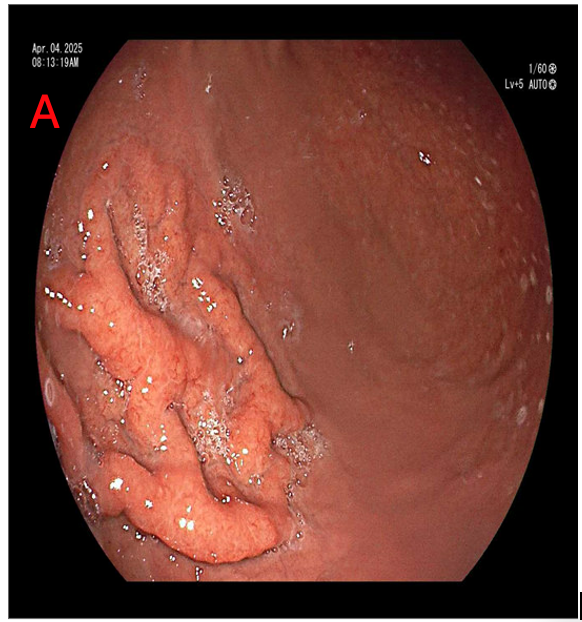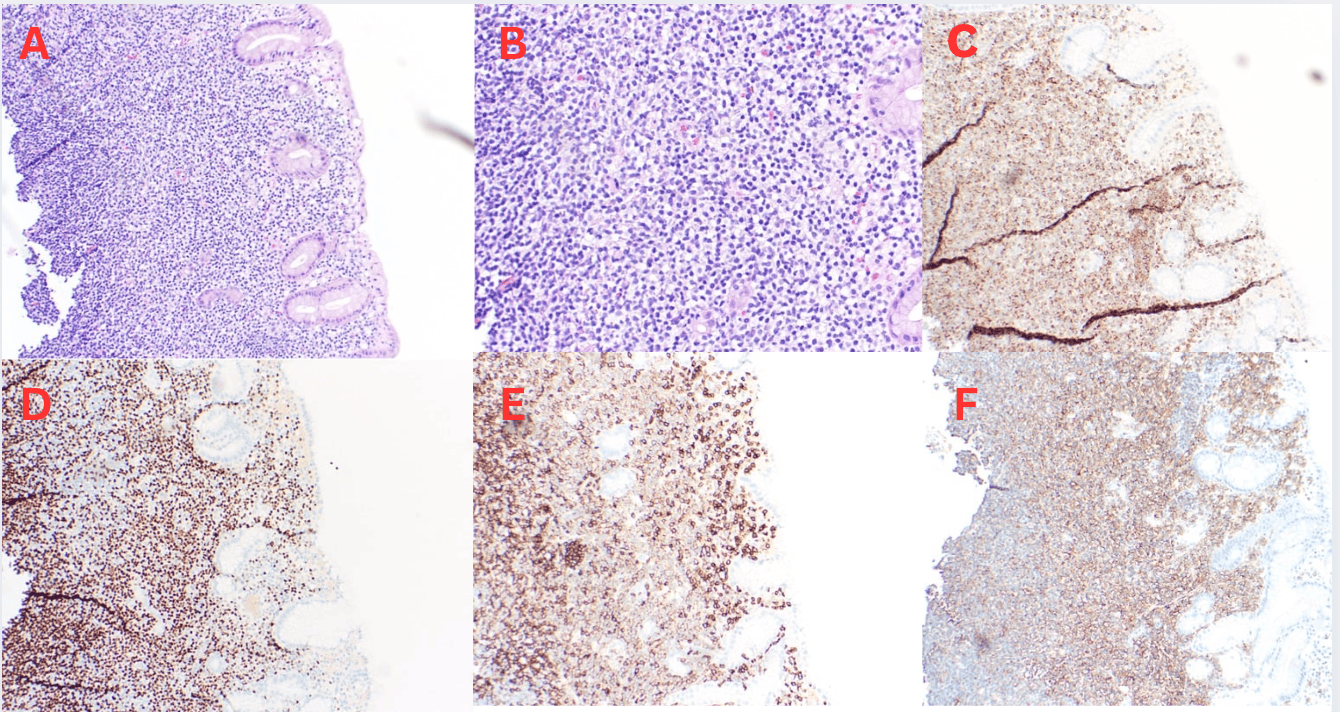Monday Poster Session
Category: Stomach and Spleen
Incidental Finding of <i>H. pylori</i>-Negative MALT Lymphoma Following Positive Cologuard Screening
P4275 - Incidental Finding of H. pylori-Negative MALT Lymphoma Following Positive Cologuard Screening
Monday, October 27, 2025
10:30 AM - 4:00 PM PDT
Location: Exhibit Hall
.jpeg.jpg)
KiBeom Kwon, MD (he/him/his)
Virginia Mason Franciscan Health
Seattle, WA
Presenting Author(s)
KiBeom Kwon, MD1, Nashwa Abed, MD2, David Fink, DO2, Nazar Hafiz, MD2
1Virginia Mason Franciscan Health, Seattle, WA; 2Washington State University Elson S. Floyd School of Medicine, Richland, WA
Introduction: H pylori-negative MALT lymphoma is a rare and challenging diagnosis, especially in asymptomatic patients. We present an unusual case of incidentally discovered H pylori-negative MALT lymphoma during a positive Cologuard workup in a patient without upper gastrointestinal symptoms.
Case Description/
Methods: A 63-year-old Caucasian obese male with type II diabetes, GERD, and chronic smoking, presented to the gastroenterology clinic after a routine positive Cologuard test. He reported daily bowel habits, but experienced intermittent constipation and occasional rectal bleeding attributed to a history of hemorrhoids. He denied abdominal pain, nausea, vomiting, unintentional weight loss, or other symptoms. He had never undergone a colonoscopy or an upper endoscopy. Given his risk factors – chronic GERD, obesity, smoking, and unspecified family history of cancer, both colonoscopy and EGD were performed. EGD showed a 5 mm salmon-colored island proximal to the Z-line, biopsied, consistent with Barrett’s esophagus. A separate 15 mm area of irregular mucosa was visualized in the gastric antrum, biopsied, and showed chronic active gastritis with lymphoepithelial proliferation and atypical lymphoid aggregates. Immunohistochemistry demonstrated B cell phenotype (CD20/PAX5 positive) with abnormal BCL-2, CD43, and MNDA expression, negative for CD10 and cyclin D, and low proliferative index. H pylori was negative. Overall, morphonology and immunophenotype were consistent with H. pylori-negative MALT lymphoma. Oncology was consulted and recommended a staging PET CT, which showed increased fluorodeoxyglucose (FDG) uptake in gastric body and antropyloric region of the stomach. Patient is arranged for oncology follow-up for further management.
Discussion: H pylori-negative MALT lymphoma is uncommon, less responsive to antibiotic therapy, and often requires radiation and systemic treatment, depending on the initial stage at diagnosis. Our patient, despite being asymptomatic, had overlapping risk factors such as chronic smoking, obesity, and an unspecified family history of cancer, which may have contributed to pathogenesis. This case highlights the importance of comprehensive gastrointestinal evaluation in colorectal cancer screening patients, particularly when risk factors warrant concurrent upper endoscopy.

Figure: Figure 1A: 15 mm maximum dimension of irregular mucosa in the gastric antrum, biopsy site.

Figure: Figure 2A-F: Histology for H Pylori Negative MALT Lymphoma
Figure 2A: H&E 10X.
Figure 2B: H&E 20X.
Figure 2C: BCL2.
Figure 2D: PAX5.
Figure 2E: CD43.
Figure 2F: CD20.
Disclosures:
KiBeom Kwon indicated no relevant financial relationships.
Nashwa Abed indicated no relevant financial relationships.
David Fink indicated no relevant financial relationships.
Nazar Hafiz indicated no relevant financial relationships.
KiBeom Kwon, MD1, Nashwa Abed, MD2, David Fink, DO2, Nazar Hafiz, MD2. P4275 - Incidental Finding of <i>H. pylori</i>-Negative MALT Lymphoma Following Positive Cologuard Screening, ACG 2025 Annual Scientific Meeting Abstracts. Phoenix, AZ: American College of Gastroenterology.
1Virginia Mason Franciscan Health, Seattle, WA; 2Washington State University Elson S. Floyd School of Medicine, Richland, WA
Introduction: H pylori-negative MALT lymphoma is a rare and challenging diagnosis, especially in asymptomatic patients. We present an unusual case of incidentally discovered H pylori-negative MALT lymphoma during a positive Cologuard workup in a patient without upper gastrointestinal symptoms.
Case Description/
Methods: A 63-year-old Caucasian obese male with type II diabetes, GERD, and chronic smoking, presented to the gastroenterology clinic after a routine positive Cologuard test. He reported daily bowel habits, but experienced intermittent constipation and occasional rectal bleeding attributed to a history of hemorrhoids. He denied abdominal pain, nausea, vomiting, unintentional weight loss, or other symptoms. He had never undergone a colonoscopy or an upper endoscopy. Given his risk factors – chronic GERD, obesity, smoking, and unspecified family history of cancer, both colonoscopy and EGD were performed. EGD showed a 5 mm salmon-colored island proximal to the Z-line, biopsied, consistent with Barrett’s esophagus. A separate 15 mm area of irregular mucosa was visualized in the gastric antrum, biopsied, and showed chronic active gastritis with lymphoepithelial proliferation and atypical lymphoid aggregates. Immunohistochemistry demonstrated B cell phenotype (CD20/PAX5 positive) with abnormal BCL-2, CD43, and MNDA expression, negative for CD10 and cyclin D, and low proliferative index. H pylori was negative. Overall, morphonology and immunophenotype were consistent with H. pylori-negative MALT lymphoma. Oncology was consulted and recommended a staging PET CT, which showed increased fluorodeoxyglucose (FDG) uptake in gastric body and antropyloric region of the stomach. Patient is arranged for oncology follow-up for further management.
Discussion: H pylori-negative MALT lymphoma is uncommon, less responsive to antibiotic therapy, and often requires radiation and systemic treatment, depending on the initial stage at diagnosis. Our patient, despite being asymptomatic, had overlapping risk factors such as chronic smoking, obesity, and an unspecified family history of cancer, which may have contributed to pathogenesis. This case highlights the importance of comprehensive gastrointestinal evaluation in colorectal cancer screening patients, particularly when risk factors warrant concurrent upper endoscopy.

Figure: Figure 1A: 15 mm maximum dimension of irregular mucosa in the gastric antrum, biopsy site.

Figure: Figure 2A-F: Histology for H Pylori Negative MALT Lymphoma
Figure 2A: H&E 10X.
Figure 2B: H&E 20X.
Figure 2C: BCL2.
Figure 2D: PAX5.
Figure 2E: CD43.
Figure 2F: CD20.
Disclosures:
KiBeom Kwon indicated no relevant financial relationships.
Nashwa Abed indicated no relevant financial relationships.
David Fink indicated no relevant financial relationships.
Nazar Hafiz indicated no relevant financial relationships.
KiBeom Kwon, MD1, Nashwa Abed, MD2, David Fink, DO2, Nazar Hafiz, MD2. P4275 - Incidental Finding of <i>H. pylori</i>-Negative MALT Lymphoma Following Positive Cologuard Screening, ACG 2025 Annual Scientific Meeting Abstracts. Phoenix, AZ: American College of Gastroenterology.
